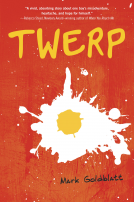 Julian Twerski lets the reader know up front that what happened to Danley was not 100% his fault, nor even a lot his fault. He happened to be there and may or may not have been able to stop it. He tantalizes from this point, hinting at the offense, and leaving the reader wondering whether the punishment will fit the crime.
Julian Twerski lets the reader know up front that what happened to Danley was not 100% his fault, nor even a lot his fault. He happened to be there and may or may not have been able to stop it. He tantalizes from this point, hinting at the offense, and leaving the reader wondering whether the punishment will fit the crime.
Julian, caught between the demands of his sixth grade English teacher Mr. Selkirk and a father who backs the teacher up, embarks on his assignment of writing “something long” in atonement. I read an advance reader copy of Twerp. The novel, to be published on May 28, is by Mark Goldblatt who says he is a lot like Julian Twerski only not as interesting.
A book is always partly what the reader brings to it. I’ve enjoyed teaching quite a few twerps in my day although mine were in seventh and eighth grade and mostly either Protestant or Catholic instead of Jewish, but that matters little. A twerp is a twerp. And a written essay was my preferred punishment method for either children born to me or those in my classroom. I can’t say I ever got one that was book length, but some amused me like Julian’s entertained Mr. Selkirk.
One is not far into the book before realizing that Julian’s best friend Lonnie will lead him straight into trouble. Julian’s story voice rings true as he follows Lonnie into various sixth grade antics, as he decides to take Mr. Selkirk’s offer to continue his narrative to get out of doing a book report on Julius Caesar, and as he follows the crowd in ostracizing Danley Dimmel whose real name is Stanley Stimmel. He dismisses his own behavior by noting that in a perfect world Danley would not have been born “hard of hearing or soft in the head.”
Twerp, written by an adult who’s channeled his sixth-grade boy for other sixth-grade boys, is an entertaining read with occasional reminders that atonement is due for what was done to Danley Dimmel. He saves it for the end, and it’s worth waiting for.
I’ll not spoil the ending, but it brought to mind a time when I was one-on-one with a student who had indulged in the deep hurt that words can bring. Mentioning his target, I demanded, “How do you think he felt?”
“How would I know?” he answered. “I’m not him.”
I was dumbfounded and speechless at his dismissal of his victim’s feelings. His words returned to mind when I saw students deliberately being cruel to each other. I pondered on how to give students the gift of empathy. I think one answer may be in story, in reading books like Twerp where the reader becomes one with the character and actually feels his pain.